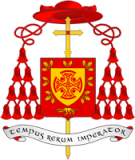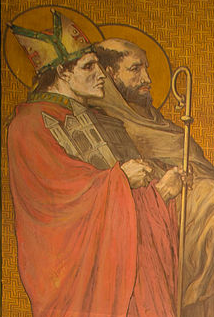 |
L'Eglise Aristotelicienne Romaine The Roman and Aristotelic Church
Forum RP de l'Eglise Aristotelicienne du jeu en ligne RR
Forum RP for the Aristotelic Church of the RK online game
 
|
| Voir le sujet précédent :: Voir le sujet suivant |
| Auteur |
Message |
Jolieen

Inscrit le: 28 Mai 2018
Messages: 3052
|
 Posté le: Mer Juil 03, 2019 7:05 pm Sujet du message: [GB]Saint Guillaume (William) Posté le: Mer Juil 03, 2019 7:05 pm Sujet du message: [GB]Saint Guillaume (William) |
 |
|
| Citation: |

Guillaume Pinchon was bishop of Saint-Brieuc, he is famous for having contributed to the safeguarding of the Breton Church as well as for his actions in favor of the poor.
Birth, beginning of priesthood, opposition Duke of Brittany and exile
Guillaume Pinchon was born in Fleur d'Aulne, an estate located on the river Flora in the parish of Saint-Alban dependent on the county of Penthièvre, in 1184. His great piety designates him very quickly for the Orders and he will join the seminary of Saint-Brieuc where he will be noticed by Bishop Josselin. After being ordained by the latter, he will become his secretary and then canon of the cathedral and will keep until the death of the bishop a very close link with this one. He will retain his functions with the successors of Josselin and in 1220 the Briochin clergy will ask Pope Honorius III to appoint him Bishop of Saint-Brieuc. Once consecrated bishop, he made sure to open his episcopal palace to the poor to feed them and give them a roof. He will undertake at this time the gigantic construction of the cathedral.
In 1225 a conflict broke out in Rennes with the Duke of Brittany Pierre Mauclerc about the fortifications of the city, the Duke wants to seize the grounds of the Church, which causes the wrath of the Bishop of Rennes. The Duke does not hesitate then to attack the clergy by suppressing several episcopal rights, he will be a persecutor of the clergy and destroyer of religious buildings. William will stand against him with indomitable firmness for the defense of the rights of the Church, even excommunicating the Duke of Brittany. The city of Saint-Brieuc was then treated harshly. Commissioners came there to execute the decrees; but William, though threatened with death, tore his priests and his servants more than once, when they were taken to prison. To spare his people greater misfortunes, he consented to leave the country.
Exile in France
Having left Saint-Brieuc, he will go to live in Poitiers at a time when the Bishop was then overwhelmed with infirmities and could not go to the care of the ministry. He joyfully received William, who undertook all the episcopal duties and acquitted himself with the greatest zeal. He will also go to Tours where he will meet the Archbishop to advise him.
Then he went to Rome with the Bishop of Rennes to meet Pope Gregory IX who confirmed the excommunication of the Duke and placed Brittany under ban in 1228. Anger rumbled among the people and the Duke Pierre Mauclerc was deeply worried by the Pope and by King Louis IX, he also went to Rome to submit to the Pope and restore religious peace to Britain in 1230.
Back to Saint-Brieuc
Once the Duke submitted, his excommunication was lifted, Britain is no longer under prohibition and Guillaume now took the way home. He stopped at Angers where he recovered the remains of St Brieuc, which have been there since the Normandy incursions into Brittany. As soon as he entered Brittany, he was greeted by the faithful of all the Breton dioceses, and was acclaimed in Saint-Brieuc. When he returned from exile, he made a procession in the city where he was welcomed by all the faithful of the country of Saint-Brieuc. It must be said that he brought home the remains of Brieuc, the Holy Founder.
After crossing the valley of Gouedic in order to return to Saint-Brieuc, a ray of sunshine came to light the trunk that contained the remains and then noise was heard in the trunk. This sign was interpreted as the joy of the holy founder, happy to find his city. Subsequently the building site of the cathedral resumed its course. Guillaume went himself to the streets to receive donations to help the site. On July 29, 1234, at the age of 53 and after 17 years of episcopacy, he feels more and more tired. He then gathered his clergy, celebrated a mass and always in the cathedral, began a prayer. At that moment he closed the eyes of the body to open those of the soul. He now rests in the cathedral he built himself. Soon the Briochins came to kneel before his grave, and from then signs appear, generosity, healing. Remnants are then displayed above his grave, venerated as relics.
William and the Briochins
- After returning from his exile in France, he will declare to the Briochins about the cathedral: "dead or alive I will finish it" .This will prove to be almost exact since at his death there will remain only a few finishes to perform.
- William made his episcopal palace "the house of the Most High". He himself received all the poor and many times he was seen to activate the fire to boil the pot. The year 1225 was particularly terrible. The groups that came daily to the Episcopal Manor increased. William faced as far as his resources. His granaries were emptied; he borrowed wheat from him. When the famine became more urgent, he made himself a beggar and went through the city to beg the bread of his children. Now the pot is in the cathedral of Saint-Brieuc, it reused every July 29 to feed the poor in memory of William.
His pot is kept in the Church of Saint-Brieuc.
It is celebrated on July 29.
|
_________________

Cardinal-Deacon of the British Isles -Bishop In Partibus of Lamia - Prefect to the Villa of St.Loyat - Expert to the pontificial collages of Heraldry - Assessor to the Developing Churches |
|
| Revenir en haut de page |
|
 |
|
|
Vous ne pouvez pas poster de nouveaux sujets dans ce forum
Vous ne pouvez pas répondre aux sujets dans ce forum
Vous ne pouvez pas éditer vos messages dans ce forum
Vous ne pouvez pas supprimer vos messages dans ce forum
Vous ne pouvez pas voter dans les sondages de ce forum
|
|






